2024届高考英语备考冠词课件(共19张PPT)
文档属性
| 名称 | 2024届高考英语备考冠词课件(共19张PPT) | 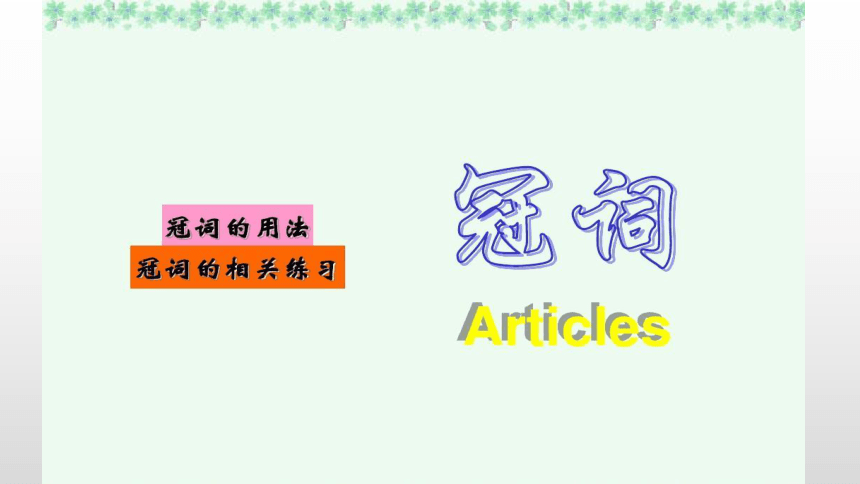 | |
| 格式 | pptx | ||
| 文件大小 | 208.5KB | ||
| 资源类型 | 教案 | ||
| 版本资源 | 通用版 | ||
| 科目 | 英语 | ||
| 更新时间 | 2023-07-30 12:52:07 | ||
图片预览

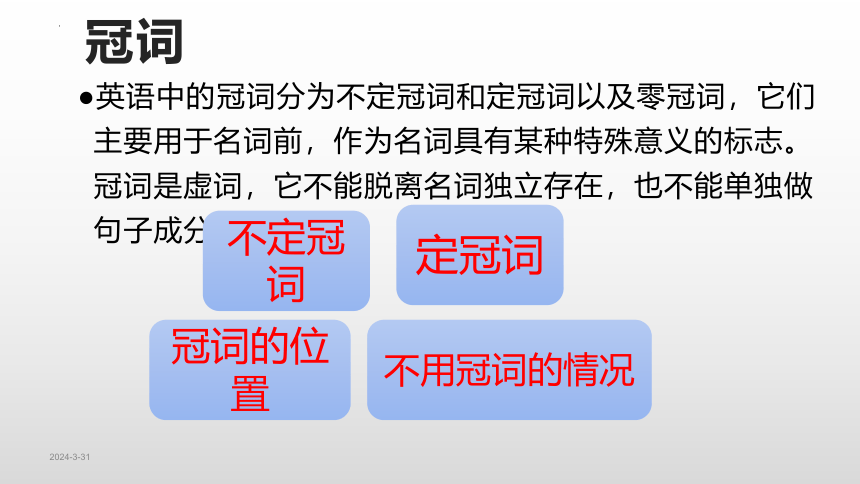
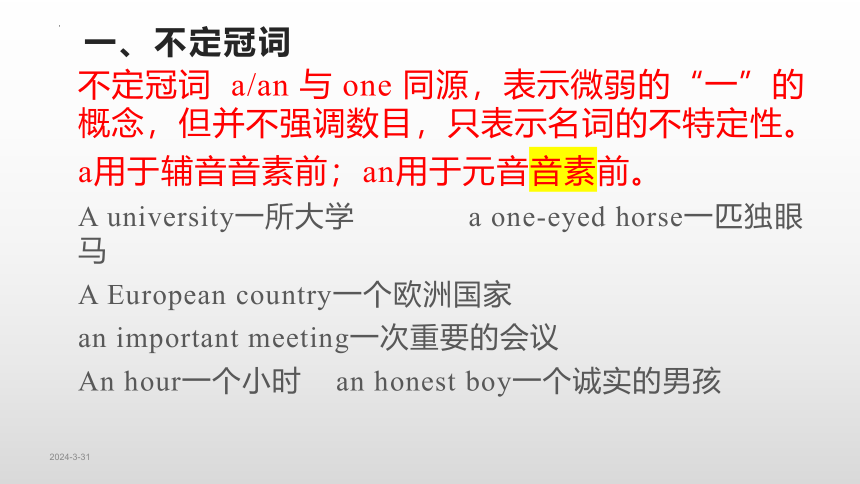
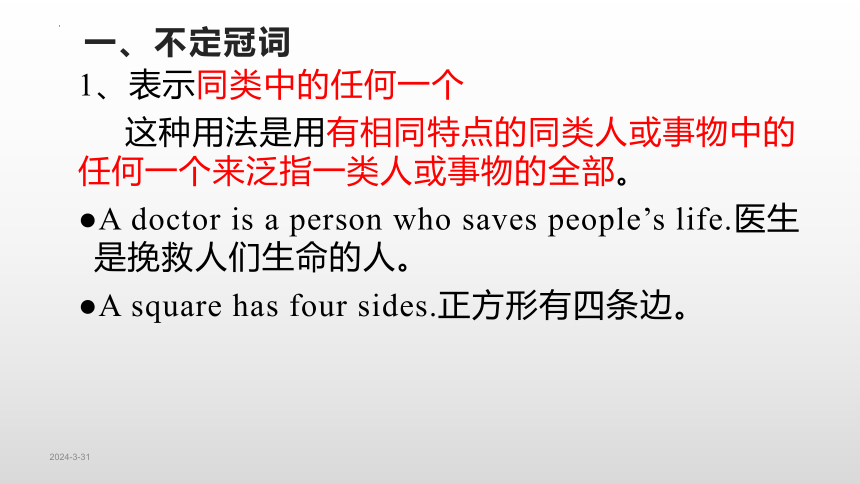
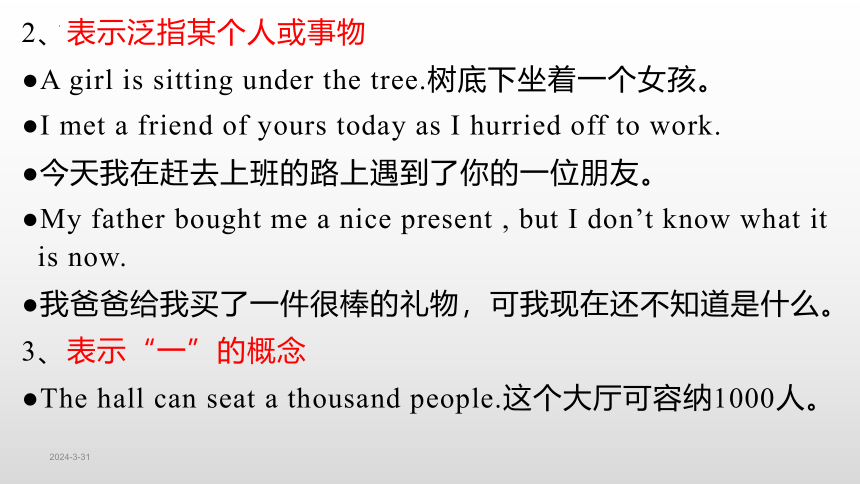
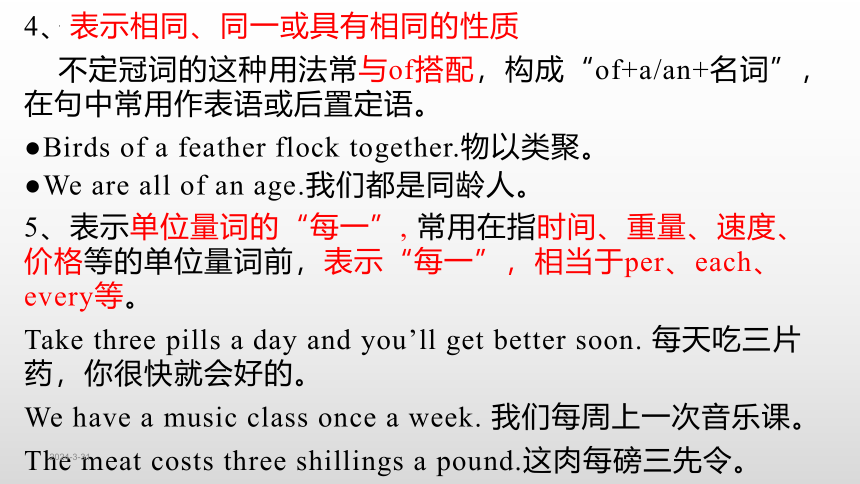
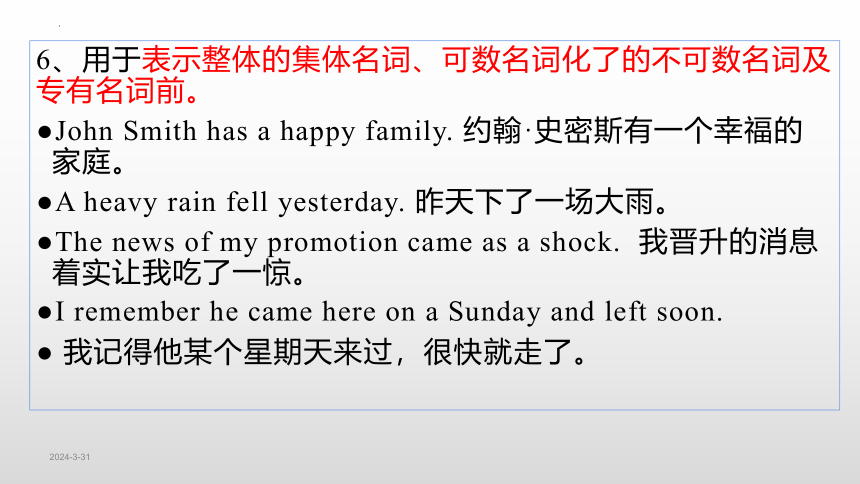
文档简介
(共19张PPT)
冠词英语中的冠词分为不定冠词和定冠词以及零冠词,它们主要用于名词前,作为名词具有某种特殊意义的标志。冠词是虚词,它不能脱离名词独立存在,也不能单独做句子成分。一、不定冠词不定冠词a/an与one同源,表示微弱的“一”的概念,但并不强调数目,只表示名词的不特定性。a用于辅音音素前;an用于元音音素前。A university一所大学a one-eyed horse一匹独眼马A European country一个欧洲国家an important meeting一次重要的会议An hour一个小时an honest boy一个诚实的男孩一、不定冠词1、表示同类中的任何一个这种用法是用有相同特点的同类人或事物中的任何一个来泛指一类人或事物的全部。A doctor is a person who saves people’s life.医生是挽救人们生命的人。A square has four sides.正方形有四条边。2、表示泛指某个人或事物A girl is sitting under the tree.树底下坐着一个女孩。I met a friend of yours today as I hurried off to work.今天我在赶去上班的路上遇到了你的一位朋友。My father bought me a nice present , but I don’t know what it is now.我爸爸给我买了一件很棒的礼物,可我现在还不知道是什么。3、表示“一”的概念The hall can seat a thousand people.这个大厅可容纳1000人。4、表示相同、同一或具有相同的性质不定冠词的这种用法常与of搭配,构成“of+a/an+名词”,在句中常用作表语或后置定语。Birds of a feather flock together.物以类聚。We are all of an age.我们都是同龄人。5、表示单位量词的“每一”,常用在指时间、重量、速度、价格等的单位量词前,表示“每一”,相当于per、each、every等。Take three pills a day and you’ll get better soon.每天吃三片药,你很快就会好的。We have a music class once a week.我们每周上一次音乐课。The meat costs three shillings a pound.这肉每磅三先令。6、用于表示整体的集体名词、可数名词化了的不可数名词及专有名词前。John Smith has a happy family.约翰·史密斯有一个幸福的家庭。A heavy rain fell yesterday.昨天下了一场大雨。The news of my promotion came as a shock.我晋升的消息着实让我吃了一惊。I remember he came here on a Sunday and left soon.我记得他某个星期天来过,很快就走了。7、用于表示某一方面、某一部分等特殊含义的不可数名词前不可数名词如education(教育)、history(历史)、knowledge(知识,学问)、population(人口)、time(时间)、world(世界)等,在表述其某一部分或某一方面的内容、概念时,尤其有修饰时,前面常用不定冠词。Have a long history拥有悠久的历史Receive a good education接受良好的教育Aknowledge of English and computer英语和计算机知识8、用于部分动词短语中具有动作意义的名词在与动词have、take、make、give等一起构成短语时,名词前常用不定冠词,表示一种短暂性动作。Have a look/walk/break/bath/swim看一下/散步/休息一下/洗澡/游泳Take a rest/walk/break/bath休息一下/散步/休息一下/洗澡Make a choice/decision/plan/study作选择/作决定/制定计划/研究Give a whistle/laugh/smile/shout吹口哨/笑/微笑/大喊二、定冠词定冠词the与this/that/these/those同源,定冠词,是虚词,本身不能单独使用,也没有词义,用在名词的前面,帮助指明名词的含义。区别于不定冠词,定冠词具有确定的意思,用以特指人或事物,表示名词所指的人或事物是同类中的特定的一个,以别于同类中其他的人或事物,相当于汉语中的“那个”或“这个”的意思。它可以和单、复数名词,也可以和不可数的名词连用。1、特指上文提到过特定的人或事物
I went to a nearby restaurant. The food there was good , but the service of the restaurant was terrible. 我去了附近一家饭店,那里的饭菜很好,但服务很糟糕。
I have been staying here for two weeks. The two weeks has been wonderful.
我在这里待了两周了,这两周过得非常好。
2、特指上文虽未提及,但谈话人都知道的人或事物
Would you turn down the radio a little The baby is sleeping.
请把收音机音量调小点好吗?孩子正在睡觉。
Close the windows before you leave the lab.离开实验室前请关上窗子。
3、用在表示宇宙间独一无二的事物的名词前
The sun was shining and birds were singing. 阳光照耀,鸟儿啼鸣。
Man travelled to the moon scores of years ago.几十年前人类就登上了月球。
4、用在可数名词单数前表示一类人或事物
The brain is the centre of thought.大脑是思维的中心。
The cat, like the dog, is liked by many people.狗和猫一样受到很多人的喜欢。
The pen is mightier than the sword. 笔胜于剑,文胜于武。
5、用在表示地点、方位和时间的固定短语中
In the world 在世界上 in the country 在乡村
at the corner在拐角处 In the east 在东方
from the west 从西方 on the left 在左边
6、用于序数词前或比较等级所修饰的名词前
He is always the first to come and the last to leave.他总是第一个来最后一个离开。
Maths is the most difficult subject and English is the easiest, I think.
我认为数学是最难的科目,而英语是最简单的。
Which story is more interesting (story) of the two 这两个故事哪个更有趣?
7、用于“the+比较级…,the+比较级…”结构中
The more love we give, the more love we’ll receive. 我们付出的爱越多,得到的爱就越多。
The more careful you are, the fewer mistake you will make.你越仔细,出的错越少。
8、用于某些形容词或形容词化的过去分词前表示一类人或事物
The new is to take the place of the old. 新生事物最终会替代旧事物。
The poor in Africa are still suffering from hunger. 非洲的穷人仍然在挨饿。
In the air crash, the number of the wounded was ten. 这次空难中受伤的有十人。
9、用于被演奏的西洋乐器名词前The boy of no more than four years old can play the piano very well.这个年仅四岁的男孩钢琴弹得很好。Shall we dance to the guitar 我们可以跟着吉他跳舞吗?10、用于集体名词、物质名词前The museum is open to the public.博物馆对公众开放。The people in this country are kind and ready to help.这个国家的人民善良而且乐于助人。The iron is harder than the stone.铁比石头硬。11、用于表示世纪或年代的词前In the 19thcentury在十九世纪in the fifties在50年代In the 1980s/1980’s在20世纪80年代12、用于“动词+sb.+介词+the+身体部位”的结构中The policeman caught the thief by the arm.警察抓住了小偷的胳膊。A stone hit me in the face as I walked by the garden.我从花园经过时一块石头击中了我的脸。13、用于“by+the+计量单位名词”结构中By the pound/foot/yard按磅/英尺/码By the hour/ day/ week/ year按小时/日/星期/年14、用于表示地名、组织名、江河、海洋、海湾、沙漠等的专有名词前The Great Wall the Yellow Riverthe US the UN不用冠词的情况:1.专有名词、物质名词、抽象名词、人名、地名等名词前:Beijing University2.季节、月份、星期、节假日、一日三餐前不用冠词;3.学科、语言、棋类、球类等名词前;4.与by连用表示交通工具或通讯方式的名词前;例如:play football, play chess, learn science, by bus/car/bike, in May / June... Wednesday/Thursday1. For her, the return of the ring was _____wonder.2. He missed_______gold in the high jump, but will get______second chance in the long jump.3. Now, years later, this river is one of________most outstanding examples of environmental cleanup.4. I went to ______countryside with my father to visit grandparents.5. I hired the car by_________hour.我按小时租了这辆车。冠词练习atheathethean
冠词英语中的冠词分为不定冠词和定冠词以及零冠词,它们主要用于名词前,作为名词具有某种特殊意义的标志。冠词是虚词,它不能脱离名词独立存在,也不能单独做句子成分。一、不定冠词不定冠词a/an与one同源,表示微弱的“一”的概念,但并不强调数目,只表示名词的不特定性。a用于辅音音素前;an用于元音音素前。A university一所大学a one-eyed horse一匹独眼马A European country一个欧洲国家an important meeting一次重要的会议An hour一个小时an honest boy一个诚实的男孩一、不定冠词1、表示同类中的任何一个这种用法是用有相同特点的同类人或事物中的任何一个来泛指一类人或事物的全部。A doctor is a person who saves people’s life.医生是挽救人们生命的人。A square has four sides.正方形有四条边。2、表示泛指某个人或事物A girl is sitting under the tree.树底下坐着一个女孩。I met a friend of yours today as I hurried off to work.今天我在赶去上班的路上遇到了你的一位朋友。My father bought me a nice present , but I don’t know what it is now.我爸爸给我买了一件很棒的礼物,可我现在还不知道是什么。3、表示“一”的概念The hall can seat a thousand people.这个大厅可容纳1000人。4、表示相同、同一或具有相同的性质不定冠词的这种用法常与of搭配,构成“of+a/an+名词”,在句中常用作表语或后置定语。Birds of a feather flock together.物以类聚。We are all of an age.我们都是同龄人。5、表示单位量词的“每一”,常用在指时间、重量、速度、价格等的单位量词前,表示“每一”,相当于per、each、every等。Take three pills a day and you’ll get better soon.每天吃三片药,你很快就会好的。We have a music class once a week.我们每周上一次音乐课。The meat costs three shillings a pound.这肉每磅三先令。6、用于表示整体的集体名词、可数名词化了的不可数名词及专有名词前。John Smith has a happy family.约翰·史密斯有一个幸福的家庭。A heavy rain fell yesterday.昨天下了一场大雨。The news of my promotion came as a shock.我晋升的消息着实让我吃了一惊。I remember he came here on a Sunday and left soon.我记得他某个星期天来过,很快就走了。7、用于表示某一方面、某一部分等特殊含义的不可数名词前不可数名词如education(教育)、history(历史)、knowledge(知识,学问)、population(人口)、time(时间)、world(世界)等,在表述其某一部分或某一方面的内容、概念时,尤其有修饰时,前面常用不定冠词。Have a long history拥有悠久的历史Receive a good education接受良好的教育Aknowledge of English and computer英语和计算机知识8、用于部分动词短语中具有动作意义的名词在与动词have、take、make、give等一起构成短语时,名词前常用不定冠词,表示一种短暂性动作。Have a look/walk/break/bath/swim看一下/散步/休息一下/洗澡/游泳Take a rest/walk/break/bath休息一下/散步/休息一下/洗澡Make a choice/decision/plan/study作选择/作决定/制定计划/研究Give a whistle/laugh/smile/shout吹口哨/笑/微笑/大喊二、定冠词定冠词the与this/that/these/those同源,定冠词,是虚词,本身不能单独使用,也没有词义,用在名词的前面,帮助指明名词的含义。区别于不定冠词,定冠词具有确定的意思,用以特指人或事物,表示名词所指的人或事物是同类中的特定的一个,以别于同类中其他的人或事物,相当于汉语中的“那个”或“这个”的意思。它可以和单、复数名词,也可以和不可数的名词连用。1、特指上文提到过特定的人或事物
I went to a nearby restaurant. The food there was good , but the service of the restaurant was terrible. 我去了附近一家饭店,那里的饭菜很好,但服务很糟糕。
I have been staying here for two weeks. The two weeks has been wonderful.
我在这里待了两周了,这两周过得非常好。
2、特指上文虽未提及,但谈话人都知道的人或事物
Would you turn down the radio a little The baby is sleeping.
请把收音机音量调小点好吗?孩子正在睡觉。
Close the windows before you leave the lab.离开实验室前请关上窗子。
3、用在表示宇宙间独一无二的事物的名词前
The sun was shining and birds were singing. 阳光照耀,鸟儿啼鸣。
Man travelled to the moon scores of years ago.几十年前人类就登上了月球。
4、用在可数名词单数前表示一类人或事物
The brain is the centre of thought.大脑是思维的中心。
The cat, like the dog, is liked by many people.狗和猫一样受到很多人的喜欢。
The pen is mightier than the sword. 笔胜于剑,文胜于武。
5、用在表示地点、方位和时间的固定短语中
In the world 在世界上 in the country 在乡村
at the corner在拐角处 In the east 在东方
from the west 从西方 on the left 在左边
6、用于序数词前或比较等级所修饰的名词前
He is always the first to come and the last to leave.他总是第一个来最后一个离开。
Maths is the most difficult subject and English is the easiest, I think.
我认为数学是最难的科目,而英语是最简单的。
Which story is more interesting (story) of the two 这两个故事哪个更有趣?
7、用于“the+比较级…,the+比较级…”结构中
The more love we give, the more love we’ll receive. 我们付出的爱越多,得到的爱就越多。
The more careful you are, the fewer mistake you will make.你越仔细,出的错越少。
8、用于某些形容词或形容词化的过去分词前表示一类人或事物
The new is to take the place of the old. 新生事物最终会替代旧事物。
The poor in Africa are still suffering from hunger. 非洲的穷人仍然在挨饿。
In the air crash, the number of the wounded was ten. 这次空难中受伤的有十人。
9、用于被演奏的西洋乐器名词前The boy of no more than four years old can play the piano very well.这个年仅四岁的男孩钢琴弹得很好。Shall we dance to the guitar 我们可以跟着吉他跳舞吗?10、用于集体名词、物质名词前The museum is open to the public.博物馆对公众开放。The people in this country are kind and ready to help.这个国家的人民善良而且乐于助人。The iron is harder than the stone.铁比石头硬。11、用于表示世纪或年代的词前In the 19thcentury在十九世纪in the fifties在50年代In the 1980s/1980’s在20世纪80年代12、用于“动词+sb.+介词+the+身体部位”的结构中The policeman caught the thief by the arm.警察抓住了小偷的胳膊。A stone hit me in the face as I walked by the garden.我从花园经过时一块石头击中了我的脸。13、用于“by+the+计量单位名词”结构中By the pound/foot/yard按磅/英尺/码By the hour/ day/ week/ year按小时/日/星期/年14、用于表示地名、组织名、江河、海洋、海湾、沙漠等的专有名词前The Great Wall the Yellow Riverthe US the UN不用冠词的情况:1.专有名词、物质名词、抽象名词、人名、地名等名词前:Beijing University2.季节、月份、星期、节假日、一日三餐前不用冠词;3.学科、语言、棋类、球类等名词前;4.与by连用表示交通工具或通讯方式的名词前;例如:play football, play chess, learn science, by bus/car/bike, in May / June... Wednesday/Thursday1. For her, the return of the ring was _____wonder.2. He missed_______gold in the high jump, but will get______second chance in the long jump.3. Now, years later, this river is one of________most outstanding examples of environmental cleanup.4. I went to ______countryside with my father to visit grandparents.5. I hired the car by_________hour.我按小时租了这辆车。冠词练习atheathethean
